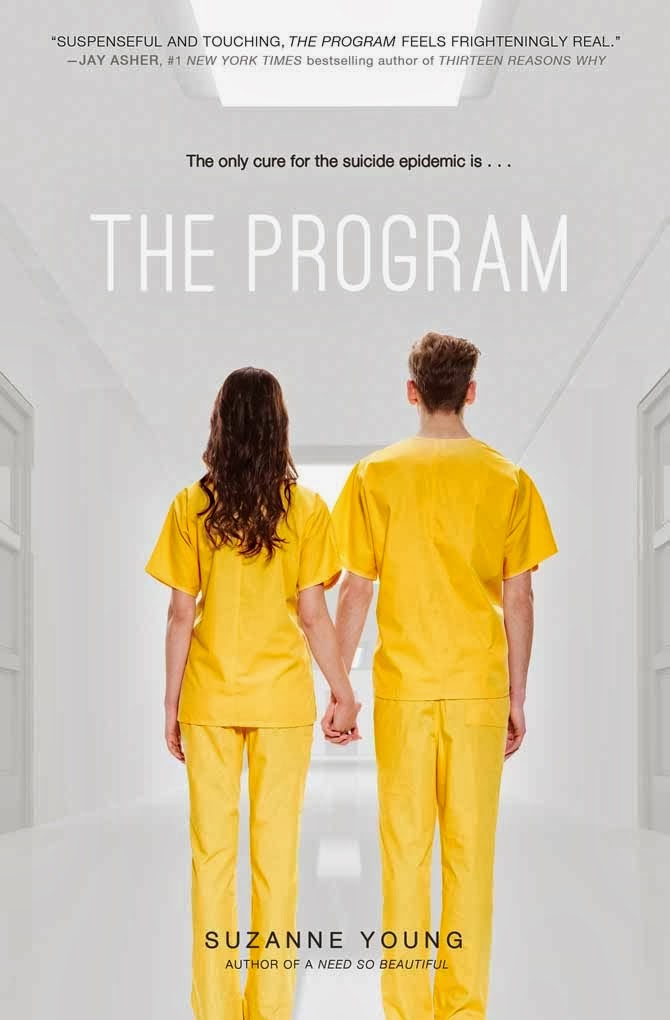I don't eschew young adult fiction as a matter of principle, but I also don't seek it out. For every Hunger Games YA book that's insightful and well-written, there's gotta be at least three Twilights.
But the premise of
The Program by Suzanne Young was irresistible. Think
1984 meets
Eternal Sunshine of the Spotless Mind.
Sloane and James are high school sweethearts who have been each other's main support through the unfathomable suicide of Sloane's brother, who was James's best friend. He wasn't the only loss they've endured: Suicide has become a teenage epidemic, thought to be contagious, and several of their friends have succumbed. The cure for the epidemic is The Program. Locked away and drugged for six weeks in a facility that wipes away "infected" memories, teens who have been flagged as a suicide risk are unwritten and rewritten, and return to squeaky clean lives where people around them know more about who they are than they do. Sloane and James show emotion only to each other, because they never want to be carted off to The Program and made to forget their romance. But The Program is always watching.
I imagine that as a writer, having teenage characters is freeing. You can explore vulnerabilities that you're supposed to have overcome by the time you're an adult, and if done with sophistication, you can resonate with a much broader audience than teens. The Program is one of those good YA books that's easy to read but not dumbed down.
This isn't a fluff dystopian. Young has written a terrifying novel where every paranoid fear is justified. The futility of Sloane's fight to keep her memories is sickening. Whether any part of her will survive and piece together clues of her past kept me clicking forward on my Kindle for hours at a time.
I've often thought that I'd love to Eternal Sunshine out whole chunks of my life. But what would be left? Would I, like Sloane, have all the grief but be confounded by not knowing its source? Would I be drawn to the same people? Young's book makes me want to hold my painful memories in a safe place, where I won't lose them but where I won't constantly revisit them. Because without them, I'm not sure I'd be the same Liz.
As for the greater societal questions the book brings up. Is The Program evil? I'm sure any parent would choose it over risking the loss of their child. And yes, some people get so lost in their agony that they are incapable of making a healthy choice for themselves.
While the book didn't touch on many valid alternatives, it makes me think about how mental illness is treated.
I'm sure that for many people who need care, it is never addressed. And while I'm on Team Take Your Meds If You Need Them, I remember how quick a doctor was to try to prescribe me a sleeping pill when I made a comment about insomnia. (And yet they get all cagey and weird about refilling my migraine meds.) There's this approach to addiction, eating disorders and other ailments that focuses on intensive treatment for a few weeks and then meetings and maintenance. But even if you can take a month off your life — and not many can — isn't it hard to readjust? Then we've got the Baker Act and psychiatric holds, which to me sound traumatic and too brief to even scratch at a problem. There's therapy, but often people can't afford it or don't go because they think it's indulgent or means they're wearing a big "Hey everyone, I'm crazy!" sign.
So my point is, I think we have a climate where a last-resort solution like The Program could one day exist, because the solution isn't obvious, and we tend to seek one-size-fits-all answers. That makes the book so much more terrifying.
A sequel that wraps up the story, called The Treatment, comes out in April.










